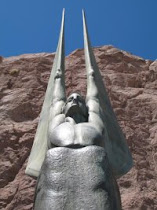 Ugh.
Ugh.When we left our Ape friends in Conquest, they had just revolted against their human masters. Caesar was the leader of this new race of Apes, and the course of the future seemed set. But again, to unnecessarily fill in that gap, Hollywood brought us Battle for the Planet of the Apes.
The movie is book-ended with scenes of John Huston (!?) as the Lawgiver, the prophet of the Apes (now *that* would be a great movie title), teaching children their past. The opening title tells us it is "North America, 2970," which is approximately 1,000 years since Cornelius & Zira came to Earth. This scene is very brief, and just leads us into the tale of Caesar and the Apes after the revolution.
We're not given the exact date, but based on the age of Caesar's son, Cornelius, I would guess it is anywhere from 10 to 15 years since the revolution. The Apes live in a primitive village of treehouses away from the cities, which were apparently destroyed by humans in a nuclear war. They kind of gloss over the details, but the city is now a twisted heap of metal, and human civilization is close to non-existent.
Caesar's goal is for Apes and humans to co-exist peacefully. Unfortunately, a new general, Aldo, doesn't share that dream. They both seem to have no problem enslaving humans, however.
Caesar leads an expedition into the devastated city to access the archives. He wants to view recordings of his parents, so he can finally get to know them. While there, they attract the attention of the few remaining humans still living in the underground of the city. They are irradiated badly, and I assume they are the progenitors of the mutants we see in Beneath.
The city humans decide to attack the country Apes, and while Caesar was gone General Aldo convinced the country Apes to attack all humans. Caesar's son overhears Aldo's plot to take over and is attacked. Eventually he dies, and Caesar takes out his rage first on the attacking humans, and then on the Ape responsible.
The "battle" scene is pretty awful. It lasts for about 30 minutes, but this is no epic war production. Seriously, it looked like a bunch of LARPers out in a park on a Saturday afternoon. I had that exact thought while watching it, and then I later learned in the trivia on IMDb that indeed, that location became Malibu State Park.
Eventually, the Apes win. Ceasar causes the death of Aldo, and all is right with the world. We return to the Lawgiver finishing his lecture. As the camera pans to his audience, we see it is comprised of both Apes and humans, living in harmony. We continue the pan to a statue of Caesar. With a close-up on his stone face, we see a single tear form, then roll credits with funky music. No dramatic fade to black with eerie sound effects fading to silence for this film.
This chapter was a complete waste of time and my least favorite of the series. It had a weak premise going in, just because it was a story that didn't need to be told. In addition, the script was lame, there were almost no interesting ideas, and it just ended up being very bland.
I will give them some credit for the ending and the double-meaning of the title, similar to Escape. The obvious reference is to the physical battle between the Apes and the city under-dwelling humans to see who will rule the
It's a theme that is brought up in several of the sequels: can we change the future? The coda at the end of the movie suggests that Caesar was successful, and that humans and Apes are co-existing with neither in a position of power. This is significant because it means that the Apes saga managed to dodge what would otherwise be a giant, five movie, time paradox causality loop.
-Taylor leaves Earth, goes to future, finds Apearth.
-Taylor discovers atomic bomb, destroys Apearth.
-Cornelius & Zira escape Apearth, go to past.
-In the past, Cornelius & Zira have Milo/Caesar.
-Caesar grows up, leads Ape revolution.
And right here, we could go straight into the original film. It would all fit, yet somehow the future Apes have caused their own existence through Caesar. Instead, Battle steps in and alters that future, so that Caesar actually prevents it from coming to pass.
In both Escape and Battle, different characters talk about the nature of time, using the same metaphor. They describe time as a wide highway with many lanes. Even though the highway is all going the same direction, each lane leads to a different destination. The question posed is: is it possible to change lanes? It's kind of a weird metaphor, but I will give the writers credit for sticking to it for the last three films.
Technically, I should be done with my Ape-ril Madness Marathon, but I decided to go ahead and watch Tim Burton's remake. So, one more review to go before my series recap.











No comments:
Post a Comment